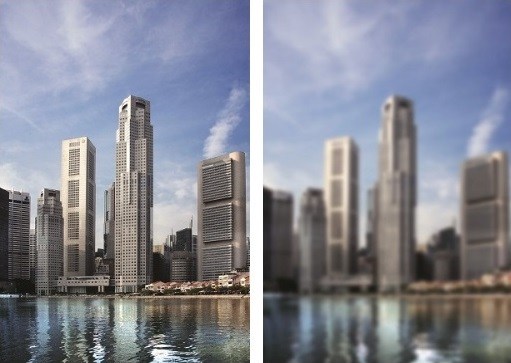
Corneal refractive laser eye surgery has been widely used for the last 30-years to correct a range of vision impairment conditions. From PRK to LASIK, and now SMILE®, which is the forefront of the 3rd generation laser vision correction procedures, and a ground-breaking treatment that has redefined the field of refractive surgery.

Some refractive surgical procedures reshape the cornea (SMILE, LASIK, PRK, etc). Other procedures implant a lens in your eye. Either way, the goal is the same – to focus light correctly on the retina so you can see more clearly and reduce or eliminate the need for glasses or contact lenses.
SMILE is the latest advance in refractive eye surgery, and is the first minimally invasive flapless procedure.
It is designed to treat a multitude of refractive errors such as myopia, hyperopia, presbyopia, and astigmatism. The procedure is known to be ‘gentle’ and involves using a femtosecond laser to create a corneal lenticule which is extracted whole through a small incision without the use of an excimer laser.
With SMILE, patients can expect shorter treatment times, faster recovery, less side effects and excellent outcomes with high predictability.
LASIK is the most common type of refractive eye surgery. It uses a laser to reshape the cornea and correct vision. During the procedure, a thin flap is created on the cornea, and a laser is used to remove some of the underlying corneal tissue to change its shape. The flap is then repositioned, and the cornea heals on its own.
ICL is a type of refractive eye surgery that involves implanting a lens inside the eye to correct vision. Unlike other types of refractive eye surgery, ICL does not alter the shape of the cornea, and it is typically used for patients who are not good candidates for LASIK or PRK.
RLE (Refractive lens exchange), also known as clear lens extraction, is a surgery to correct extreme farsightedness (hyperopia) or near sightedness (myopia)
Phakic intraocular lens implants are designed specifically to correct near sightedness (myopia). It is called phakic because the natural lens is left untouched.
AK (Astigmatic keratotomy) is a surgical procedure to correct moderate to severe astigmatism. Incisions are made at the steepest point of the cornea to flatten it.
Epi-LASIK is a procedure similar to PRK. A very thin membrane is detached from the cornea, and the cornea is reshaped by the excimer laser. A soft contact lens is used to protect the area until healing occurs. TransPRK smooth SurfACE has replaced this treatment as a more beneficial treatment associated with a faster recovery.
Seeing near to far after cataract surgery.
A cataract is a clouding of the eye’s natural lens creating a decrease in the quality of vision and image sharpness, causing text and objects to look dull or blurry. Replacing the eye’s natural lens with the IC-8 lens will help bring life back into focus. The IC-8 lens is ideal for individuals who want clear vision across a full focal range from reading an SMS, watching television to driving without having to rely on glasses.
Refractive surgery is usually performed on an outpatient (day surgery) basis and generally only a few minutes to complete.
Most people experience significant improvement in their vision within a few days to a week after the surgery. However, it is important to have regular follow-up visits with your ophthalmologist to monitor your recovery and ensure that your vision is stable.
Yes, a referral from either a GP or an Optometrist is required if you wish to claim the Medicare rebate.
You do not require a recent eye test from an optometrist prior to booking a consultation with us, as all patients will be refracted at our clinic during their initial consultation to test for suitability and to discuss your eye health history.
To be eligible for laser eye surgery you must:
*If you are over 45 years of age, you may still be eligible for other procedures. Please fill out our online questionnaire and we’ll get back to you to discuss your options.
No, you will not experience any pain during the procedure. Your eyes will be numbed with anaesthetic eye drops prior to the procedure. However, some discomfort after surgery is normal, particularly for PRK due to more laser work being performed to the cornea. Hence, it is imperative you follow the post-operative eye drop regime to promote the healing of your eyes.
The cost will depend on the type of laser eye surgery you are having. Our surgical booking manager will be able to provide you with a quotation once you are deemed eligible by Dr Brian Harrisberg.
It is important that when deciding on what to do with your eyes, cost should not be the defining criteria. Rather, we want the best operation for your eyes and hopefully only one procedure which will last years and years. In this way, you will offset the cost that you would normally use for contact lens and glasses.
Yes. Rest assured you will be given oral medication before the surgery to mildly sedate and relax you. There is also no need to worry about blinking throughout the procedure because we use an instrument (called a ‘speculum’) to hold your eyes open.
Laser eye surgery is effective until the age of 45 when ‘presbyopia’ occurs. This is when your near vision begins to deteriorate and you’ll be needing reading glasses.
What’s the difference between PRK, LASIK and SMILE?
Type of Laser | Recovery Time | Pros | Cons |
PRK (oldest) | 1-2 weeks |
|
|
LASIK | 1-3 days |
|
|
SMILE (newest) | 1-3 days |
|
|
Complete our short online questionnaire below, and a member of our clinical team (orthoptist) will offer you a free telehealth consultation to determine your eligibility for laser eye surgery.
Once your eligibility has been confirmed, you will be scheduled for a 1-hour refractive consultation with our orthoptist. This session will include testing and measuring your eyes, as well as receiving information on the various laser procedures, what to expect before, during, and after surgery, and address any queries you may have.
You will have a thorough consultation with your chosen ophthalmologist, who will evaluate the health of your eyes and recommend the safest and most beneficial laser procedure for your long-term vision. Following this, our surgical booking manager will provide you with a quotation and schedule your surgery.
Laser eye surgery is performed on Friday mornings, and you will be discharged on the same day. Please arrange transportation for after the procedure as you will not be able to drive. You will have the weekend to rest and recover before your follow-up appointment at our clinic on Monday. As part of our service, you will receive complimentary 1-year post-operative care, and laser enhancement (if needed).
Refractive eye surgery is a sub-specialised area of ophthalmic surgery. It is important to see an ophthalmologist who specialises in refractive surgery for a thorough evaluation to determine if you are a good candidate for the procedure. Below are our ophthalmologists who specialise in refractive surgery.
Dr Brian Harrisberg has been practicing refractive surgery since 1997 (27+ years), distinguishing himself as one of the few laser eye surgeons in Sydney capable of performing the Small Incision Lenticule Extraction (SMILE) procedure. His priority lies in identifying the best surgical option tailored to individual patient needs, showing fairness in choosing procedures, and remaining unaffected by commercial influences on equipment.
“My personal interest in ophthalmology is centered around the subspecialties of cataract and refractive surgery. This is something I've been passionate about for 25+ years, and I've developed my skills so that I can apply them to my patients for ongoing care throughout their lives.”
Dr Brian Harrisberg
To enquire about refractive laser (corrective) eye surgery, please complete the following form and one of our orthoptists will get back to you to discuss the procedure and whether you qualify.